Reviewed by Glenn Erickson
Fred Zinnemann (The Search, The Sundowners) marshals a nigh-perfect production and strives to keep it intimate despite the tendency of the historical costume epic to expand everything with empty pomp and pageantry. Actor Paul Scofield had little faith in his merit as a screen performer, yet he brings Robert Bolt's powerful words to life in a performance yet to be bettered.
I once edited an interview for a DVD docu in which Steve McQueen's ex-wife lamented that McQueen didn't get the Best Actor Oscar for The Sand Pebbles. She rolled her eyes and said that, 'the Academy decided to go British,' as if the competition had been hijacked by a conspiracy of snobs.
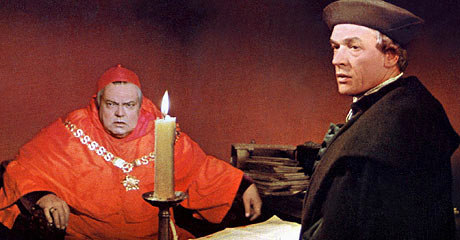
One look at A Man for All Seasons and we realize that the Academy for once chose wisely. Robert Wise's film now plays like a weak cry for peace hiding underneath three hours of macho posturing. Completely against the '60s grain of Situational Ethics, A Man for All Seasons' essential message still shines, impervious to time: great men follow the dictates of their conscience, not political expediency. That moral hasn't dated. An incorruptible man remains a rare gem.
Arbitrary Royal power comes up against an unyielding human spirit in Robert Bolt's intense, concentrated battle of wills. Cardinal Wolsey (Orson Welles) tries but fails to obtain a Papal divorce for King Henry VIII (Robert Shaw). Even though the respected man of letters Thomas More (Paul Scofield) refuses to help, Wolsey recommends him as the new Chancellor. Determined to marry his new consort Anne Boleyn (Vanessa Redgrave) the King is furious when his entreaties fail to change More's mind. To break the impasse Henry sets himself up as the head of the Church of England and legalizes his divorce and remarriage under his own authority. But that's not enough: to bend More to his will, the King demands a loyalty oath from all of his nobles. More walks a legal tightrope by staying silent on the issue. He dodges demands made by Henry's chief administrator Thomas Cromwell (Leo McKern) to show public approval for the marriage. More's wife Alice and daughter Margaret (Wendy Hiller and Susannah York) beg him to give in, as does his good friend the Duke of Norfolk (Nigel Davenport). Cromwell uses trivial technicalities to imprison More in the Tower of London. When he still won't play along, Cromwell suborns perjured testimony from young Richard Rich (John Hurt), a former More acolyte.
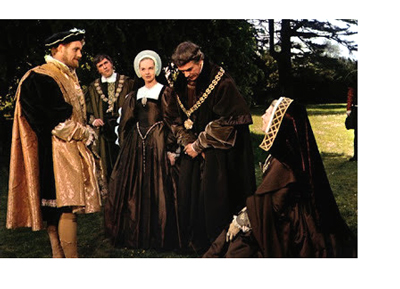
"This is not the stuff of martyrs", Thomas More states, pointing at himself. Even though he calls himself a coward and says he'll welcome any possible way to avoid trouble, the statesman refuses to compromise his convictions to the tide of hypocrisy that surrounds him. The entire establishment of England has yielded to a king determined to break most of the rules of his own coronation oath. Henry makes up any number of weak arguments to justify what is really his personal will to marry Anne Boleyn. It's a matter of the power of the crown against the rule of law, and Thomas More is the only individual brave enough to stand up to the King. As More is a highly respected, personal friend of the crown, he can't simply be declared a traitor and done away with. A Man for All Seasons charts the battle of wills as a series of debates between More and the rest of the world... his family, his friends, and the bureaucrats that need him to recant -- because they already have. More is happy to withdraw and remain silent on the issues at hand, but his enemies are too insecure to allow that. For them, silence equals passive subversion.
A Man for All Seasons is the equal of any of Robert Bolt's films, including his work for David Lean. Viewers impatient with costume dramas about centuries-old conflicts are completely absorbed by A Man for All Seasons; anyone who's ever had to compromise his ethics or his conscience to keep his job will immediately identify with Thomas More's predicament. Henry VIII doesn't want just one obstinate rule changed, he would prefer to ignore any law that gets in the way of his personal wishes and interests. Only a couple of high officials have the power to even question the King's judgment. One legislative gathering folds to the royal will without even a whimper. When the majority has fallen in line, a standout like Thomas More becomes an embarrassment and finally an insult: who does he think he is? This is how honorable men become enemies of the people without even trying.
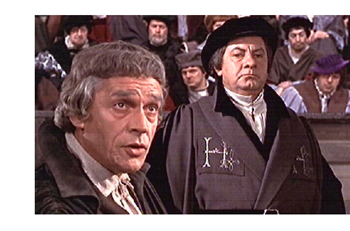
The under-praised Fred Zinnemann assembles a production that finds a balance between the intimate and the epic. London is a slow boat ride up the Thames, unless you're on the outs politically, in which case one must walk home to Chelsea in the rain. We never lack for a crowd scene but Bolt's play doesn't need much opening-up. Unless all of the locations were constructed sets, this may have been a reasonably budgeted film.
A Man for All Seasons goes for the best people available, not the biggest stars. It of course made an international figure of Paul Scofield, a great actor in relatively few films. Scofield's biggest roles before this one were in The Train and Carve Her Name With Pride, both highly recommended. Scofield is given scores of memorable speeches, explaining himself to his family and arguing the nature of ethics with his friend the Duke of Norfolk. He makes Robert Bolt's dialogues painfully clear, allowing us to share More's deep-held beliefs. When it comes time for the big public showdowns in court, Scofield plays More as a weakened man. His speeches are stirring but not the ostentatious stuff of show-stopping oratory. It's a truly great performance.
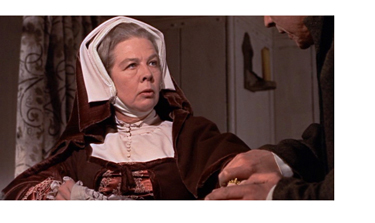
Wendy Hiller (I Know Where I'm Going!) is More's insecure wife, who complains bitterly while conceding her admiration for him. She's aware that her husband has more affection for his daughter Margaret, played by Susannah York. York marries a dunderheaded but honest young man (Corin Redgrave), who must return to the Catholic faith before getting More's consent. Interestingly, the highly ethical More sees nothing wrong with serving as his son-in-law's conscience, and forcing him to recant his chosen position on religion. The play softens this issue by making the young man seem rather wishy-washy with his opinions.
Robert Shaw's hearty Henry VIII hasn't an honest bone in his body and deeply resents More 'flaunting' his principles in his face. At least that's the way he sees it. Shaw's King is almost comical when he tries to match wits with More, trotting out terrible, self-serving rationales why the Pope had no right to sanction his first marriage -- to his brother's widow! The King disappears from the story but is still felt through the sinister actions of his secretary Thomas Cromwell. Leo McKern (The Day the Earth Caught Fire) is appropriately scheming and ruthless as the King's 'administrator', which he defines as someone who sets right and wrong aside and sees to it that the King gets his way. Cromwell is a brilliant man in his own right
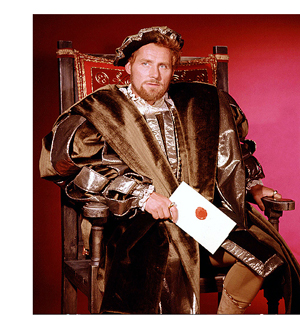 but his blind dedication to his career is hateful; he'd hang anybody in his way. One reason A Man for All Seasons hasn't dated is that we now see Cromwells every night on television, excusing their craven acts in the name of service to someone in a higher political office. If anyone is the opposite of Thomas More, it's Cromwell.
but his blind dedication to his career is hateful; he'd hang anybody in his way. One reason A Man for All Seasons hasn't dated is that we now see Cromwells every night on television, excusing their craven acts in the name of service to someone in a higher political office. If anyone is the opposite of Thomas More, it's Cromwell.
That brings us to the young John Hurt, who was then just starting out on a long film career: Alien, Rob Roy, 1984. Hurt plays the penniless student Richard Rich as an object lesson for the young and ambitious. Rich refuses More's offer of a teaching position in favor of the offices and honors promised by Cromwell. Rich acquires his title and position by perjuring himself to bring a good man down. John Hurt shows us Rich's need to 'be somebody,' even after More tries to sell him on the benefits of a quiet life as a teacher ... a quiet life More devoutly wishes he could retreat to.
Also shining is Nigel Davenport, who appears in dozens of movies but rarely received major press attention. His Duke of Norfolk is the King's man, fulfilling his duty while frequently grumbling about the cheating and corruption around him. The Duke must compromise every day, yet he cherishes More as the only honest man in England. We get a firm lesson in political necessity when More makes a public scene to alienate Norfolk. Already shunned, More spares Norfolk the burden of his friendship by turning him away. As with any great play, all of the characters question Thomas More and define his true nature.
That leaves Orson Welles, who turns in a better-than-average cameo, extremely well lighted by cinematographer Ted Moore. Nice smaller turns are offered by Colin Blakely (The Private Life of Sherlock Holmes) as More's servant, and Yootha Joyce (Die! Die! My Darling!) as a woman offering a bribe. Vanessa Redgrave is on camera for a couple of minutes as Henry's new bride Anne Boleyn; she'd go from show-biz offspring to top film star in just a year, with Morgan, Blow-Up and then Camelot.
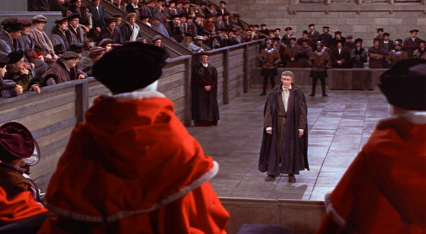
The Twilight Time Blu-ray of A Man for All Seasons is a visual and aural knockout; we can see why it nabbed all those technical awards as well as Best Picture and actor, etc.. These images don't begin to represent the quality of the HD disc. Ted Moore's shots of boats on the Thames (I think it's the Thames) remind us that every great city was once carved right out of a forest. The character lighting is excellent for Sir Thomas's various encounters. Georges Delerue's sparkling music peeks out in the title sequence's shots of nature on London's doorstep. The score is isolated on Twilight Time's discrete music track.
The extras recoup a very good historical featurette about the real Sir Thomas More, from the old DVD. Producer Selina Lin gathered three scholars (Dr. John Guy, Dr. Gerard Wegemer, Alison Weir) to give a thoughtful rundown on The Life of Saint Thomas More. The featurette expands on the film's portrait to let us know that More was at least a bit less perfect. A main issue in the Bolt play is that More seeks only silence, but the crown won't leave him in peace. In actuality, More broke his silence after resigning his office by writing many books that could easily be interpreted as critical of the power of monarchs in conflict with the law. So at some level he purposely made himself a thorn in Henry VIII's side.
The new extra is a commentary with Twilight Time's Nick Redman and Julie Kirgo and their frequent co-commentator Lem Dobbs. There's plenty to talk about; TT almost has the Paul Scofield 'great films' list wrapped up, with their excellent Blu-ray of The Train. An original trailer is included, but one made after the movie won all those Oscars. I'd say that it's a shame that studios didn't properly all their advertising campaigns, but I guess we should be happy that they've properly saved some of the movies themselves.
Julie Kirgo's liner notes sketch the politics of the time and happily highlights the involvement of the underappreciated director Fred Zinnemann, who is frequently dismissed by auteur critics yet consistently makes pictures with integrity and that communicate well with the audience. Zinnemann was an incredible artist. He was one of the Berlin wonder boys who worked on People on Sunday, he went to Mexico to make a pro-union art film in the 1930s, and rejected the Director's Guild's attempts to adopt a Thomas More-like Loyalty Oath during the Red Scare, even when the hateful Cecil B. DeMille openly questioned the loyalty of those 'foreign directors' with 'foreign' names, like (pronounced) "Zinn-e-mann. 1
A Man for All Seasons is in a way, a 'pure case' example of the way totalitarians, bigots and the just plain power-mad use legal and political systems to crush individuals because they won't conform or 'play the game' with the rest of the sellouts. Twice in Robert Bolt's play we hear the remark, "This isn't Spain, you know." The reference to the Spanish Inquisition, where torture was often used to coerce religious conversions and force confessions, reminds Sir Thomas that things are certainly not like that in England, where the law reigns paramount. Then More must watch as every noble and every institution bends the law to suit the King's will. A Man for All Seasons applies to every abuse of this kind, from show trials to the blacklist.

On a scale of Excellent, Good, Fair, and Poor,
A Man for All Seasons Blu-ray rates:
Movie: Excellent
Video: Excellent
Sound: Excellent
Supplements: Isolaed Score track; commentary with Nick Redman, Lem Dobbs and Julie Kirgo, featurette The Life of Saint Thomas More (18 min), trailer, Julie Kirgo liner notes
Deaf and Hearing Impaired Friendly?
YES; Subtitles: English
Packaging: Keep case
Reviewed: May 24, 2015
Footnotes:
1. Critcs have been beating Zinnemann's dead-on-arrival Gregory Peck / Anthony Quinn film Behold a Pale Horse forever. The director redeemed himself for that particular misstep with his superb The Day of the Jackal... now where's the Criterion special edition for that masterpiece?
Return

Text © Copyright 2015 Glenn Erickson
See more exclusive reviews on the Savant Main Page.
Reviews on the Savant main site have additional credits information and are often updated and annotated with reader input and graphics.
T'was Ever Thus.
Return to Top of Page
|

